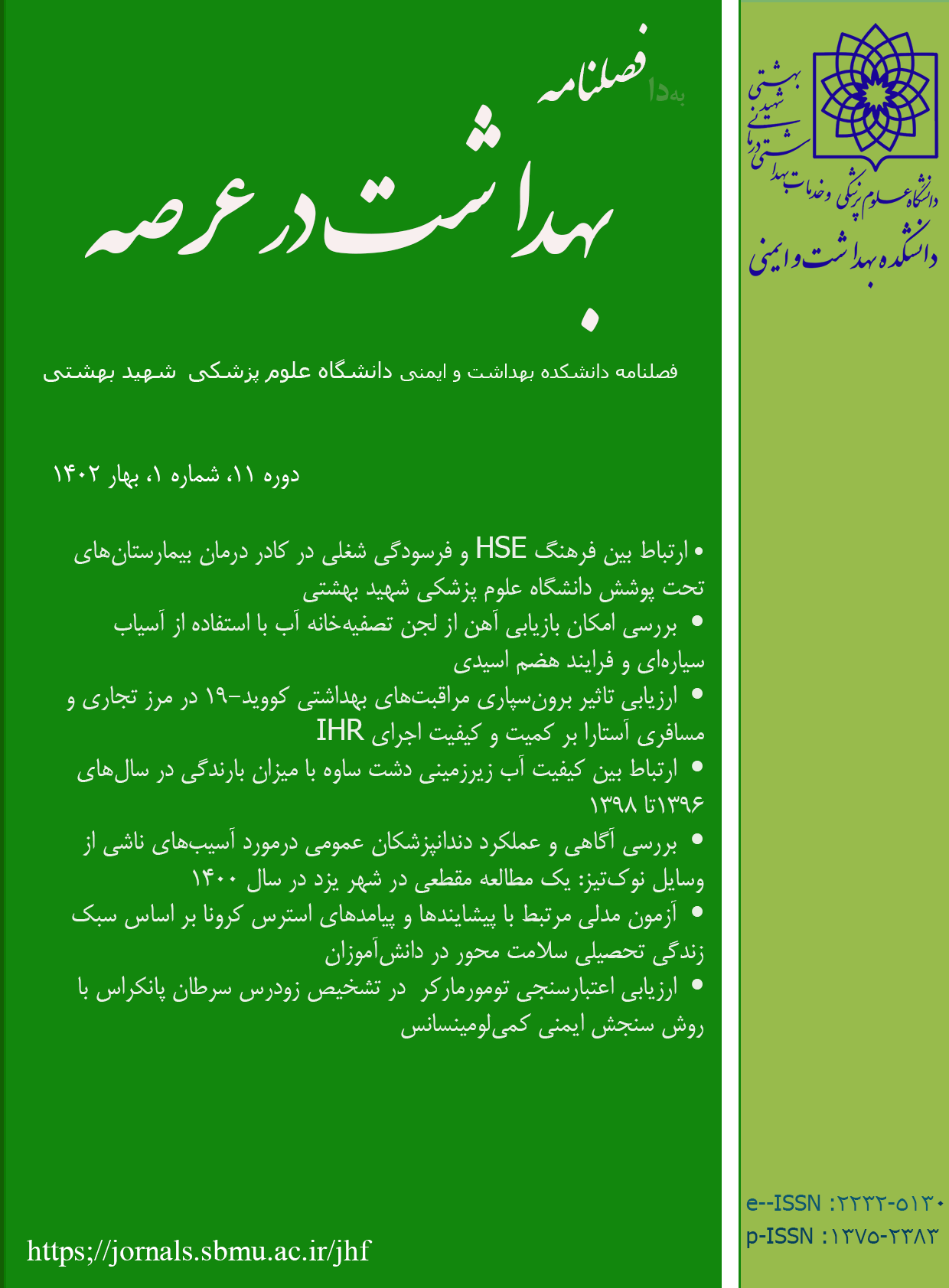تاثیر آموزش از طریق پیامک بر آگاهی و رفتار مادران باردار در مورد علائم خطر دوران بارداری
فصلنامه علمی پژوهشی بهداشت در عرصه,
دوره 6 شماره 4,
21 December 2019
,
صفحه 20-27
https://doi.org/10.22037/jhf.v6i4.23299
چکیده
زمینه و اهداف: بارداری دارای عوارض خاص خود است، لذا اطلاع رسانی به زنان در مورد علائم خطر امری حیاتی است. این مطالعه با هدف بررسی اثر بخشی آموزش از طریق موبایل در زمینه علائم خطر بارداری طراحی شده است.
مواد و روشها: مطالعه مداخلهای از نوع تجربی بوده و تعداد 120 نفر از مادران باردار، به روش نمونهگیری خوشهای انتخاب شدند. زنان به طور تصادفی به دو گروه مداخله و شاهد تقسیم شدند. در گروه مداخله، 21 پیام متنی روزانه در رابطه با علائم خطر و شکایات شایع ارسال گردید و پس از آن مجددا در طی دو هفته نکات مهم پیامها به عنوان پیام یادآور ارسال شد. اطلاعات توسط پرسشنامه جمعآوری گردید. تجزیه و تحلیل دادهها با استفاده از نرم افزار SPSS نسخة 22 و آزمونهای آماری آنالیز واریانس با تکرار مشاهدات، فریدمن و کوکران انجام شده و سطح معناداری آماری 05/0 لحاظ گردید. تمامی مراحل مطالعه حاضر، طبق موازین اخلاقی اجرا گردید.
یافتهها: پس از اعمال مداخله، نمره آگاهی در گروه مداخله، بهبود یافته (p<0.001) و تغییرات مشاهده شده در گروه مداخله بیشتر از گروه شاهد بوده است (p<0.001). نمره رفتار در هر دو گروه بهبود یافته (p<0.001)؛ ولی تغییرات مشاهده شده در گروه مداخله بیشتر از گروه شاهد بوده است (p<0.001).
نتیجهگیری: آموزش با استفاده از موبایل میتواند به بهبود آگاهی و رفتار زنان در زمینه علائم خطر کمک نماید؛ لذا انجام آن در بهبود كيفي و كمي مراقبت هاي بارداري موثر است.
- آموزش بهداشت
- تلفن همراه، زنان باردار
- علائم خطر دوران بارداری
- پیام متنی
- آگاهی
- رفتار
ارجاع به مقاله
مراجع
- WHO. Pregnancy health topics. Available from: http:// www.who.int/topics/pregnancy/en/. Accessed Apr 11, 2017.
- Iranian Ministry of Health and Medical Education. Iranian National Program on Safe Motherhood, Integrated Care on Mother’s Health, Outside Hospital Services Guide. 3ed. Tehran: Iranian Ministry of Health and Medical Education; 2010 (In Persian).
- WHO, United Nations Population Fund, UNICEF, the World Bank. Managing complications in pregnancy and childbirth. 2003. Available from: http://www.who.int/maternal_child_adolescent/documents/9241545879/en/ Accessed Apr 11, 2017
- WHO. Maternal mortality. Available from: http://www.who.int/mediacentre/factsheets/fs348/en/. Accessed Apr 11, 2017.
- Farzianpour F. Health education, its effectiveness and its impact. Tehran: Boshra 1992 (In Persian).
- Shafiee F. Community Health Education and Promotion Manual. Tehran: Tarbiat Modares University Press 2004.
- WHO. eHealth. Available from: http://www.who.int/topics/ehealth/en/. Accessed Apr 11, 2017.
- Global Health eLearning Center. mHealth Basics: Introduction to Mobile Technology for Health. Updated September 2013. Available from: https://www.globalhealthlearning.org/course/mhealth
- Global Health eLearning Center. mHealth Basics: Introduction to Mobile Technology for Health. Updated September 2013. Accessible: WHO, 2011; The Boston Consulting Group, 2012.
- Dean SV, Lassi ZS, Imam AM, Bhutta ZA. Preconception Care: Closing the gap in the continuum of care to accelerate improvements in maternal, newborn and child health. Reproductive Health 2014; 11(3):S1.
- Ledford CJ, Canzona MR, Cafferty LA, Hodge JA. Mobile application as a prenatal education and engagement tool: A randomized controlled pilot. Patient Education and Counseling 2016; 99(4):578-82.
- Global Health eLearning Center. mHealth Basics: Introduction to Mobile Technology for Health. Updated September 2013. Accessible: Mechael 2010; ADA 2011; WHO 2011.
- Centers for Disease Contorol and Prevention.The Health Communicator's Social Media Toolkit. Office of the Associate Director of Communication, Centers for Disease Control and Prevention, 2011.
- WHO. mHealth: new horizons for health through mobile technologies. 2011. Available from: http://www.who.int/goe/publications/goe-mhealth-web.pdf./. Accessed Jan. 15, 2014.
- Khokhar A. Short text messages (SMS) as a reminder system for making working women from Delhi breast aware. Asian Pacific Journal of Cancer Prevention 2009; 10(2):319-22.
- Toughyani R, Ramezani MA, Izadi M, Motie Z. The effect of prenatal care group education on pregnant mothers' knowledge, attitude and practice. Iranian Journal of Medical Education 2008; 7(2):317-24 (In Persian).
- Rajabi Naeeni M, Farid M, Tizvir A. A comparative study of the effectiveness of multimedia software and face-to-face education methods on pregnant women’s knowledge about danger signs in pregnancy and postpartum. J Educ Community Health 2015; 2(1):50-57 (In Persian).
- Okour A, Alkhateeb M, Amarin Z. Awareness of danger signs and symptoms of pregnancy complication among women in Jordan. International Journal of Gynecology & Obstetrics 2012; 118(1):11-14.
- Ayiasi RM, Atuyambe LM, Kiguli J, Orach CG, Kolsteren P, Criel B. Use of mobile phone consultations during home visits by Community Health Workers for maternal and newborn care: community experiences from Masindi and Kiryandongo districts, Uganda. BMC Public Health 2015; 1(15):560. doi: 10.1186/s12889-015-1939-3.
- Cormick G, Kim NA, Rodgers A, Gibbons L, Buekens PM, Belizán JM, et al. Interest of pregnant women in the use of SMS (short message service) text messages for the improvement of perinatal and postnatal care. Reproductive health 2012; 9(1):9.
- چکیده مشاهده شده: 254 بار
- PDF دانلود شده: 116 بار
